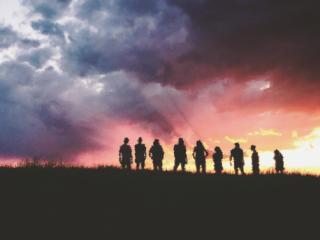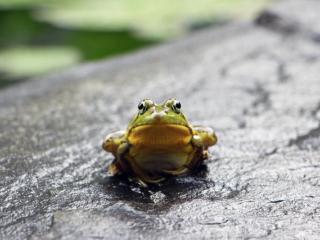It's one thing to imagine the intelligence of a forest, but could you experience it? The Japanese concept of "forest bathing" might help. Forest guide Amos Clifford is a former Zen teacher who's one of the world's experts on forest bathing.More
Science and Technology
There's a famous sequoia named General Sherman that's the biggest tree on the planet. It has its own distinctive history linked to the Civil War general and a radical anarchist group. Cultural historian Daegan Miller tells this fascinating story.More
There are two famous moments that helped shape environmental politics. Gavin Van Horn, of the Center for Humans and Nature, tells us what happened when Aldo Leopold met the eyes of a dying timber wolf and when Paul Watson looked into the eye of a dying sperm whale.More
The fact that so many animals migrate — sometimes thousands of miles — has puzzled people over the ages. Why do they take such risky journeys? Conservation biologist David Wilcove studies migration, and he says the scale of migration is staggering.More
When we talk about bees, usually we mean honeybees. Or bumblebees. But that’s just two out of 20,000 different species of bees. Thor Hanson tells Anne about how different species of bees and humanity have developed dependence on one another.More
Once you acknowledge that plants are intelligent and sentient beings, moral questions quickly follow. Should they have rights? How can we think of plants as "persons"? Plant scientist Matt Hall sorts out these ideas with Steve.More
Alchemists believed that if they could transform matter, why not also the spirit, or the self? That last part is what’s attracting new followers today, like Sara Durn.More
Venice Williams, an ordained minister, runs Alice's Garden Urban Farm in Milwaukee. She finds connection and spirituality on this land, which was once a location of the Underground Railroad.More
The promise of 40 acres and a mule didn't materialize for most Black Americans. But attorney Savi Horne, executive director of the Land Loss Prevention Project, is fighting for Black farmers to get their land back, now.More
Jeff Schloss is an evolutionary biologist. He’s also Christian. As a scientist, he’s trying to develop an evolutionary theory for the origins of religion. But he says science can’t explain everything about religion.More
Putting aside the question of whether there's any validity to it, the ancient science of astrology has a lot in common with contemporary data science. In fact, data scientist Alexander Boxer calls astrology humanity’s very first set of algorithms.More
Wade Davis has been called the Indiana Jones of anthropology. He says the aboriginal people of Australia have a fundamentally different way of seeing the world than we do in modern society.More
Alexander Rose tells Anne Strainchamps about the Clock of the Long Now — an all mechanical clock being constructed in the high desert of Western Texas designed to run for ten thousand years.More
Mathematical cosmologist Brian Swimme talks to Steve Paulson about the nature of time and the human obsession with clock time.More
Psychologist Laurie Santos created a college course to teach students how to use what scientific research has discovered about what makes us happy and why. It became the most popular class in the 300 year history of Yale.More
One of the greatest walkers of our time, William Helmreich — known for exploring every street in New York City — was an early casualty of COVID-19. But composer David Rothenberg got to walk with him one last time, around wetlands in Queens.More
Humans are not the only creatures who vocalize. Birds, whale and frogs have voices too—but are we listening? Bernie Krause has been recording environmental sounds all over the world since the 1970s. He says it's time for humans to shut up.More


















